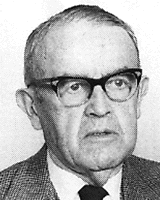Max Petitpierre facts for kids
Max Petitpierre (born February 26, 1899, died March 25, 1994) was an important Swiss politician. He was a lawyer and a member of the Swiss Federal Council. This is like Switzerland's main government team. He was in charge of the Political Department, which handles Switzerland's relationships with other countries. He led this department from 1944 to 1961.
He was chosen to join the Federal Council on December 14, 1944. He finished his work there on June 30, 1961. He was part of the Free Democratic Party.
Contents
Who Was Max Petitpierre?
Max Petitpierre was born in 1899 and lived a long life, passing away in 1994 at the age of 95. Before becoming a politician, he was a jurist, which means he was an expert in law. This background helped him a lot in his political career.
Joining the Swiss Government
In Switzerland, the government is run by the Swiss Federal Council. This council has seven members who work together to lead the country. Max Petitpierre was elected to this important group on December 14, 1944. He served for many years, stepping down on June 30, 1961.
Leading Foreign Affairs
During his time in the Federal Council, Max Petitpierre was the head of the Political Department. This department is like the Ministry of Foreign Affairs in other countries. Its job is to manage how Switzerland interacts with countries around the world. This includes making treaties and representing Switzerland on the global stage.
President of the Confederation
Max Petitpierre also had the honor of being the President of the Confederation three times. This role is like being the head of state for a year. He served as President in 1950, 1955, and 1960.
A Big Achievement: The Geneva Conventions
One of Max Petitpierre's most important achievements was his role in the 1949 Geneva Conventions. He served as the President of the Diplomatic Conference in Geneva that year. This conference created a set of international rules. These rules are very important because they protect people during wartime. They make sure that soldiers who are captured, and people who are not fighting, are treated fairly. These conventions are still used today to guide how countries act in conflicts.
 | Delilah Pierce |
 | Gordon Parks |
 | Augusta Savage |
 | Charles Ethan Porter |


